In This Episode << SLIDE LEFT TO SEE ADDITIONAL SEGMENTS
Christians in the Holy Land
KIM LAWTON, correspondent: It’s Sunday morning in the West Bank town of Bethlehem. Christians have gathered for worship at the ancient Church of the Nativity, which marks the traditional birthplace of Jesus. Local Christians like John Tawil say they feel a special tie to their faith.
JOHN TAWIL: Being a Christian in Bethlehem is something wonderful because it’s the place where Jesus was born.
LAWTON: But the 2,000-year-old Christian community here has been diminishing at an alarming rate, and some question whether Christianity can ultimately survive in the land where it began.
PROFESSOR BERNARD SABELLA (Al-Quds University): The places are important, but you need to make these places to come alive, and you cannot do that without indigenous Palestinian Christians in the Holy Land.
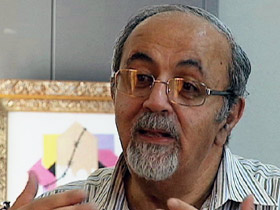 LAWTON: The overwhelming majority of Christians here are Arabs. They were among the hundreds of thousands displaced in 1948, when the State of Israel was established and in the wars that followed. For decades now, Palestinian Christians have continued to emigrate at disproportionately high rates, and their birth rates are much lower than those of Muslims. Roughly 150,000 Christians live in Israel proper—about two percent of the population. In the Palestinian Territories, it’s estimated that Christians make up just over one percent of the population. There are also small Christian minorities in disputed East Jerusalem. The circumstances for Christians vary in each of those places and, like most things here, a lot of it is shaped by the ongoing conflict.
LAWTON: The overwhelming majority of Christians here are Arabs. They were among the hundreds of thousands displaced in 1948, when the State of Israel was established and in the wars that followed. For decades now, Palestinian Christians have continued to emigrate at disproportionately high rates, and their birth rates are much lower than those of Muslims. Roughly 150,000 Christians live in Israel proper—about two percent of the population. In the Palestinian Territories, it’s estimated that Christians make up just over one percent of the population. There are also small Christian minorities in disputed East Jerusalem. The circumstances for Christians vary in each of those places and, like most things here, a lot of it is shaped by the ongoing conflict.
SABELLA: The challenge, I think, to Palestinian Christians, in my view, and to Christian communities in Israel and the Middle East, is really to stay put.
LAWTON: Bernard Sabella is a sociologist in Jerusalem who has studied the emigration patterns of his fellow Christians, especially younger Christians, in Israel and the Palestinian Territories.
SABELLA: The political situation and the economic situation together make it very hard for young people. Even when they are earning good money, and they have a secure job, relatively secure job, they feel that the prospects for the future are very dim.
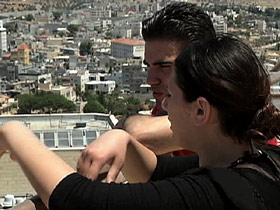 LAWTON: That’s the case for John Tawil and his friend, Mary Abu-Ghattas, who are students at the Roman Catholic-run Bethlehem University. Both are 20 years old and both were born under Israeli occupation. They say Israel’s strict security policies toward all Palestinians make West Bank life untenable.
LAWTON: That’s the case for John Tawil and his friend, Mary Abu-Ghattas, who are students at the Roman Catholic-run Bethlehem University. Both are 20 years old and both were born under Israeli occupation. They say Israel’s strict security policies toward all Palestinians make West Bank life untenable.
MARY ABU-GHATTAS: First of all, challenges in moving, which is like a basic human right, to be able to move from one point to another. Challenges in Israel controlling the water supply, Israel controlling basically any supply that comes into Palestine.
LAWTON: Mary’s Greek Orthodox family has lived for centuries in the Christian town of Beit Jala, just outside Bethlehem. She’s close to them, but also dreams of traveling to faraway places.
ABU-GHATTAS: Even though if I don’t care, like, if I have a lot of money. I just care to really be able to see the world, so, yes, that is definitely my dream, but it’s not going to—it’s not that easy to make come true considering our situation in Palestine. It’s very tempting to leave. Do we try? Yes, of course we try, like basically, obviously no one wants to leave their country, but it is hard. It’s a challenge.
LAWTON: John is part of the tiny Syriac Orthodox community. Several of his extended family members live in France and Britain. He’s a chemistry major who wants to study medicine, and he’s planning to do so abroad.
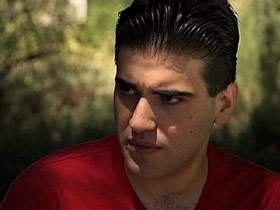 TAWIL: I would like to stay here, but I see that the peace, the peace process that they are moving in, will not achieve itself within the coming few years or within the coming 200 years. So why to suffer and struggle? Living under the occupation is not a normal life. It’s a stressed life, and we have to get out of this.
TAWIL: I would like to stay here, but I see that the peace, the peace process that they are moving in, will not achieve itself within the coming few years or within the coming 200 years. So why to suffer and struggle? Living under the occupation is not a normal life. It’s a stressed life, and we have to get out of this.
LAWTON: Bethlehem University was founded in 1973, and today about 30 percent of the students are Christians, 70 percent Muslim. University administrators are aware of the challenge they face.
BROTHER VINCENT NEIL KIEFFE (Bethlehem University): The difficulty with education is once you’ve educated someone they become mobile, and so they have opportunities elsewhere. Our goal is to try and encourage people to stay in the Holy Land. That’s why we’re here to start with.
LAWTON: Leaders of the Holy Land’s historic churches have been trying to encourage their flock to stay. For example, while the Anglican Church provides social services for all people, it’s also been developing scholarship and employment programs specifically aimed at Christians.
BISHOP SUHEIL DAWANI (Anglican Bishop of Jerusalem): We encourage them, and we do whatever we can within our capacity to keep them here in the land.
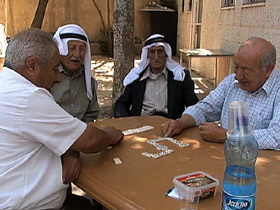 LAWTON: Christians outside the region are also trying to help. The Holy Land Christian Ecumenical Foundation [HCEF] is a US-based group with the mission of “preserving the Christian presence in the Holy Land.” HCEF runs several investment and social service projects, such as this senior citizens day-care center in the West Bank town of Birzeit. Here, they try to celebrate traditional Palestinian culture and heritage. HCEF has also renovated or built more than 300 homes for low-income Palestinian Christians. This family of six was living in one rundown room. Now they have a brand-new three-bedroom home.
LAWTON: Christians outside the region are also trying to help. The Holy Land Christian Ecumenical Foundation [HCEF] is a US-based group with the mission of “preserving the Christian presence in the Holy Land.” HCEF runs several investment and social service projects, such as this senior citizens day-care center in the West Bank town of Birzeit. Here, they try to celebrate traditional Palestinian culture and heritage. HCEF has also renovated or built more than 300 homes for low-income Palestinian Christians. This family of six was living in one rundown room. Now they have a brand-new three-bedroom home.
Church leaders worry that without a living Christian presence, the Holy Land could become like a museum or a theme park. The region’s Roman Catholic leader is Fouad Twal, who has the ancient title of Latin Patriarch. He wants pilgrims to visit not only the holy sites, but also the local Christians, whom he calls the Holy Land’s “living stones.”
PATRIARCH FOUAD TWAL (Latin Patriarchate of Jerusalem): Only with the living stones, with people, with community, it has a meaning of holy. It is not a question of building and archaeology; it is a question of life.
LAWTON: Top Western Anglican and Roman Catholic leaders have just launched a new campaign to help Christians in the Holy Land. But that can be a complicated and sometimes controversial endeavor. Many Christians, especially in American and European evangelical communities, are strongly pro-Israel. When the US and other countries moved their embassies from Jerusalem to Tel Aviv for political reasons, one group of Christians founded their own institution to support Israel. They called it the Christian Embassy.
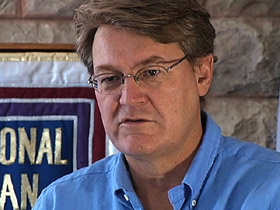 DAVID PARSONS (International Christian Embassy Jerusalem): We were founded in 1980 as an expression of comfort and solidarity with the Jewish people and their 3,000-year-old attachment to Jerusalem, and we’ve been standing on the principle of a united Jerusalem under Israeli sovereignty for 30 years now.
DAVID PARSONS (International Christian Embassy Jerusalem): We were founded in 1980 as an expression of comfort and solidarity with the Jewish people and their 3,000-year-old attachment to Jerusalem, and we’ve been standing on the principle of a united Jerusalem under Israeli sovereignty for 30 years now.
LAWTON: David Parsons says people in his community worry that some efforts to support Christians in the Holy Land can be “anti-Israel.”
PARSONS: There is this temptation when you have this sympathy for the plight of Palestinian Christians that, you know, in order to help them you have to start bashing Israel. It is a divisive issue.
LAWTON: Archbishop of Canterbury Rowan Williams contends that his campaign is actually very pro-Israel.
ARCHBISHOP ROWAN WILLIAMS (Anglican Archbishop of Canterbury): To put difficult questions to the government of Israel is a sign that we take the government of Israel seriously. It’s quite the opposite of delegitimation or whatever. It’s saying we expect the government of Israel to have a response. We expect for them to be able to bear criticism and to engage with it.
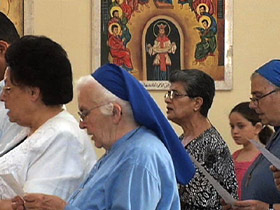 LAWTON: Parsons asserts that Christians are treated better by Israel than by other Middle Eastern nations, and he raises another controversial question: the role rising Islamic fundamentalism may play in the Christian exodus.
LAWTON: Parsons asserts that Christians are treated better by Israel than by other Middle Eastern nations, and he raises another controversial question: the role rising Islamic fundamentalism may play in the Christian exodus.
PARSONS: A lot of people look at the conflict, they look at the plight of Palestinian Christians, they look at so many of them leaving, and they want to understand why, and most of them know that the main culprit in this is Islamic militancy, both towards Jews and towards Christians.
LAWTON: Palestinian Christian leaders acknowledge there are some tensions with Muslims but say overall the two communities have lived together peacefully for centuries.
SABELLA: Our relations have been really normal relations, like neighbors. There are sensitivities in the sense that sometimes Palestinian Christians would like less of religion in the public sphere, yes. But that is not the cause for leaving.
LAWTON: Sabella says many Christians here see themselves as bridge-builders for peace and democracy.
SABELLA: If you lose the Palestinian Christians, then you lose, in a sense, the promise of a multireligious and open and democratic and pluralist society, and I’m saying that not simply to the Palestinian Territories; also to Israel.
TWAL: I consider all the inhabitants—Jews, Muslims, Christians—as my faithful, my people, my children, and I must take care of them. My dream is to see our children playing together in a normal life, a normal way in this holy, holy land. Until now, this dream, my dream, is only a dream.
LAWTON: And as peace remains elusive, many church leaders say their biggest challenge may be keeping their flock from despair.
DAWANI: Jerusalem for us Christians is a city of hope, because it is the city of the resurrection, and it is the city of hope, and hope is a very important concept in our lives. If we lose hope, we lose everything. But we still have hope.
LAWTON: The leaders believe that is the ultimate message of their faith, which was formed in this land.
I’m Kim Lawton in Israel and the West Bank.

